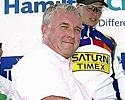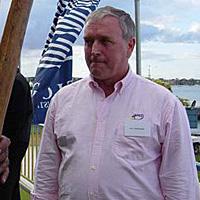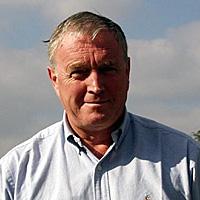
Recently on Cyclingnews.com |
An interview with Pat McQuaid, August 17, 2005
Next in line? - Part I
With just over a month to go until the election of the next President of the UCI at its congress on September 23rd in Madrid, Pat McQuaid is seen as favourite to take over from Hein Verbruggen as supremo of world cycling. That's changed in recent weeks, with allegations of improper conduct coming from within the organisation. In Part I of this interview with Cyclingnews' Shane Stokes, he speaks about his chances of being the next UCI President and those allegations. In Part II, McQuaid looks at further election issues and the future of international cycling in relation to the ProTour.
Pat McQuaid was given the backing of the UCI’s management committee just under
two years ago in Hamilton, and with strong contacts worldwide, being elected
was seen as a virtual certainty.
What appeared to be a potentially seamless transition to the top job for the
Irishman has become a little rocky, with allegations of improper behaviour being
made from within the UCI itself. Management committee member Sylvia Schenk had
become increasingly disillusioned with the UCI and made a complaint to the Ethics
Commission of the International Olympic Committee, claiming that McQuaid had
been paid by the UCI since moving to Switzerland earlier this year (see Cyclingnews'
interview with Schenk for details). Schenk claimed that this payment was
forbidden by article 52 of the constitution, which states that "no member
of the Management Committee shall be bound by an employment or service contract
with the UCI, a federation or a continental confederation at the same time."
Predictably, Schenk’s petition to the IOC was not looked on favourably by Hein Verbruggen and the rest of the Management Committee. On July 29th the UCI issued a strongly worded statement which expressed solidarity with the President, rejected her claims of corruption and declared that "all relations with her will be stopped with immediate effect." Undeterred, she told Cyclingnews this week that she would fight on, taking her complaints to other tribunals if necessary, including the Court of Arbitration for Sport in Switzerland.
For his part, McQuaid maintains all has been above board. When contacted by Cyclingnews earlier this week, the 55 year old former pro rider said that any payments he received have been allowable expenses. "They are permitted," he stated. "There is no clash with the constitution."
"The UCI are not financing my campaign," he insisted. "The Irish federation are assisting me in my campaign, and they have been doing quite a bit of work for me, lobbying for me and campaigning for me. The work that I'm doing in the UCI offices at the moment is absolutely nothing to do with my campaign. It is completely separate to that. So I don't think there is really any cause for concern there."

|
McQuaid says that he is satisfied that the UCI will be cleared by any inquiry. "I am quite comfortable with any of the investigations and appeals that are going on, and confident that things will go on the favour of the UCI board."
"I think it is very unfortunate that that situation has arisen," he stated. "I don't agree that things haven't been done as they should. I have acted at all times with the board’s wishes. I think it is unfortunate now that we have a board member who has made her way up through the cycling world to be president of her federation and to go onto the board of the UCI and then, for whatever reason, she loses the presidency of her federation and the support of her federation. She is due to step down from the UCI in September and so she has nothing to lose. She wishes to bring this situation to boil. I don't agree with this and I would be quite confident that, in time, the president, Mr Verbruggen, and the UCI board will be exonerated." He is similarly dismissive of the other concerns voiced by Sylvia Schenk.
Should McQuaid negotiate these choppy waters and succeed in his bid to become UCI President, one of the most crucial issues he will have to face in the first months - or even years - of his term is to bring the ProTour back from the abyss. The series was originally intended to encompass the biggest events in the sport, expanding upon the one-day World Cup circuit by adding the three Grand Tours and several shorter stage races. The draw of the best riders and the best teams in the best events is an undeniably powerful one, ensuring media and public interest while also giving increased meaning and relevance to the achievements of the rider who leads the series. However, the introduction of the new circuit has been anything but smooth; early criticisms included complaints that the euro-centred slant of the ProTour marginalised countries outside Europe, and that non ProTour races would suffer a drop in interest. Since then, an even bigger concern has been the deepening spat between the UCI, the ProTour teams and the Grand Tour organisers, the latter group claiming that their concerns and conditions were being dismissed out of hand.
McQuaid sees it a different way. "The update [about the situation] is that the Grand Tour organisers met with President Verbruggen early last week, and we felt that there was an agreement possible," he said. "Then, three days later, they turned around with a whole lot of other conditions, which they weren't prepared to budge on. They put out a press release stating what their position was and they waited then for the response of the teams, because they knew what the UCI's position was on the points that were brought forward."
"my candidacy isn’t something which is necessarily surprising. "-McQuaid explains the progression of his career |
"But the teams refused to accept the conditions as laid down by the Grand Tours. So, from that point of view, it looks like they are putting themselves out on a wing and threfore the UCI will then have to act and create a calendar for them and their events, separate to the ProTour."
Without the three Grand Tours, plus the historical monuments of Milan-San Remo, Paris-Nice, Tirreno Adriatico, Paris-Roubaix, Liège-Bastogne-Liège, Flèche Wallonne, Paris-Tours and the Tour of Lombardy, the ProTour would undoubtedly lose a lot of its lustre. Bobby Julich was delighted with his success in the Eneco Tour of the Benelux last week, but he’s hardly likely to regard it on a par with his victory in Paris-Nice earlier this year. Yet McQuaid says that if needs be, the ProTour can survive without the big three and their events.
"It can do, yes. It certainly could survive, there are other races wanting to come into the ProTour and it could open up things for them," he states. "At the end of the day, the other [non-ProTour] races will survive as well. The teams will then ride by choice the events they wish to ride."
"It is an unfortunate situation but it is one which has been brought about by virtual complete intransigence on the part of the three Tours, in particular the Tour de France," he says.
Cyclingnews: You are tipped to take over from Hein Verbruggen at the UCI congress in Madrid on September 23rd. What stage are things at in your campaign?
Pat McQuaid: Well, I am a candidate for the presidency and I would hope that I'll be successful. I have been involved in cycling all my life, coming from a family with a big tradition in the sport. My father raced, I raced as an amateur and a professional, and my children currently compete at quite a high level. I have been involved at the highest level of cycling, organising high-level events since 1984, so that’s over 20 years. I have been involved with the UCI management committee for the past eight years, have been president of the Road Commission, and I have seen a lot of changes in those years. So, my candidacy isn’t something which is necessarily surprising.
I know that from the amount of travelling I have done around the world over the past 20 years due to cycling, and even before then as national coach, I have a lot of contacts and a lot of support from different parts of the cycling world. As you might know, I've been working quite a lot in Asia for the past 10 years, trying to develop cycling in that part of the world. I have a lot of support out there. So my support is fairly global, from that point of view. I hope that everything will go well on the day [of the election].
CN: Why should people vote for Pat McQuaid? What benefits will you bring to the sport?
PMcQ: I will bring a global perspective of cycling. I will bring a lot of experience in the global scene, much more so than the basic European aspect, so to speak. I have a lot of experience at the highest level, and likewise as national federation level. Having been Irish Federation President, I know the problems federations suffer. The UCI is comprised of federations - it has 175-odd of them - and each of those has needs. I think as president of the UCI you need to be able to address those needs in the best way possible. I think through the various initiatives which the UCI have been instigating in recent years - and I am involved in quite a few of them, setting up the CMC and so forth - it does give us the opportunity to assist the smaller federations, those that don't have quite the same resources as the bigger federations, the rich European federations.

|
Then, with the continued development of that area from the CMC onto continental centres and national training centres, which we are continuously developing in recent years, and will continue to develop further in years to come, I think the UCI will be seen to do what its role is - to develop cycling worldwide.
One other important thing is that I feel I'll bring a certain independence to the role. I am coming from a small federation, as opposed to being someone from one of the bigger federations, who might lean towards that federation if they were elected.
CN: So do you have policies laid out, specific goals that you want to achieve?
PMcQ: I have specific aims and goals laid out, yes. When it comes to the time to do so, these will be addressed to the delegates.
CN: There have been recent suggestions that things haven't been done as they should, with UCI management committee member Sylvia Schenk telling Cyclingnews that she is not happy with your campaign. How you respond to that?
PMcQ: I think it's very unfortunate that that situation has arisen. I don't agree that things haven't been done as they should. I have acted at all times with the board’s wishes. I think it is unfortunate now that we have a board member who has made her way up through the cycling world to be president of her federation and to go onto the board of the UCI and then, for whatever reason, she loses the presidency of her federation and the support of her federation. She is due to step down from the UCI in September and so she has nothing to lose. She is a lawyer, she has nothing to lose, and so she wishes to bring this situation to boil. I don't agree with this and I would be quite confident that, in time, the president, Mr Verbruggen, and the UCI board will be exonerated.
CN: So you are comfortable with the IOC investigation, that things will go in your favour?
PMcQ: I am quite comfortable with any of the investigations and appeals that are going on, and confident that things will go in the favour of the UCI board.
CN: In her interview with Cyclingnews, Sylvia Schenk alleges that the UCI are financing one of the three candidates for presidency, making the suggestion that the three candidates aren't on an equal level democratically. How do you respond to that?
"Any decisions that have been taken in recent months since Hamilton 2003 have been completely in accordance with the statutes"-McQuaid asserts that UCI decisions are always above board |
PMcQ: I wouldn't accept that. The UCI are not financing my campaign. The Irish federation are assisting me in my campaign, and they have been doing quite a bit of work for me, lobbying for me and campaigning for me. The work that I'm doing in the UCI offices at the moment has absolutely nothing to do with my campaign. It's completely separate to that. So I don't think there is really any cause for concern there.
CN: But Hein Verbruggen has admitted that you have been getting expenses from the UCI. Do you feel that this is allowed under the UCI Constitution?
PMcQ: Yes, it is allowed under the Constitution.
CN: Sylvia Schenk also told Cyclingnews that Hein Verbruggen has contacted all the electoral delegates asking for their support in voting for you, while at the same time not passing on their contact information to the other delegates. Is that true?
PMcQ: Well, the truth of the matter is that to get those details, the UCI had to go to the five continental presidents and ask for the details from them, which we did. We have passed on the information of the five continental presidents to each of the two other voting delegates, so they can do the same. The voting delegates are the responsibility and the prerogative of each continental confederation. The UCI has no power, no authority and no right to give out those names and addresses because they belong to each continental confederation. So what we have done is give the contact details of the five confederation presidents to the other candidates...they can then do what we had to do to follow that up.
CN: To clarify things, it was at the UCI congress back in Hamilton 2003 that your candidacy was approved by the board?
PMcQ: Yes, that is the case. It was agreed unanimously by the board then.
CN: What can you say to those who may be concerned that there isn't a true democratic process going on?
PMcQ: Well, the UCI is one of the most respected international federations in the world, and always has been. Particularly under the leadership of Hein Verbruggen when he took over the ‘new’ UCI, so to speak, about 14 years ago. We have achieved a huge amount in those years under his leadership and at all times - and I have worked closely with him for the past eight years - he has always been concerned that any decisions that we take stay within the statutes of the UCI Constitution. He is a very strict and very rigid one like that. And that will continue to be the case. Any decisions that have been taken in recent months since Hamilton 2003 have been completely in accordance with the statutes, and indeed have all been unanimously passed by the board.
In Part II of Shane Stokes' interview with Pat McQuaid, the election for UCI Presdent is discussed further, as is the fate of the ProTour, and how the UCI aims to guide the sport through this current difficult period.

